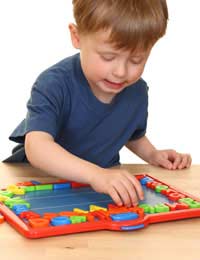Learning Disabilities in Children

For some children learning comes easily and school is an exciting place of both academic and social achievement. Other kids, however, do not find the experience to be as pleasant, having difficulty with schoolwork and often, with socialisation as well. It's not that children with learning disabilities are any less intelligent than their peers, but they may have more difficulty reading, writing, reasoning, remembering or organising information.
Common Learning Disabilities
It is widely believed that many learning disabilities are caused by a problematic nervous system that affects receiving, processing, or communicating information and are seen in about 10% of children. Some children with learning disabilities are also hyperactive; unable to sit calmly, easily distracted, and have difficulty staying on task. While there are numerous learning disabilities, some of the most widely known are:- Dyslexia: Sometimes referred to as a reading disability, dyslexia is a language based issue in which children have difficulty comprehending written materials.
- Dysgraphia: Simply put, a disorder in which children have an especially difficult time writing within a defined space (as on lines) and/or forming letters.
- Dyscalculia: Children who have difficulty grasping mathematical concepts and solving math problems may be diagnosed with dyscalculia.
- Auditory and Visual Processing Disorders: Children with normal vision and hearing may still have trouble understanding language.
- Nonverbal Learning Disabilities: Originating in the right hemisphere of the brain, nonverbal learning disabilities cause difficulties with organisation, intuitive thinking, and visual/spatial conceptualising.
What to Look For
While the term "learning disabilities" is a bit of a blanket phrase, there are some things that parents can look for that may signify possible problems with their children's capacity to learn in a traditional classroom setting using regular teaching methods. Kids with learning disabilities need special attention, geared toward their specific learning deficits. Signs that children may need to be evaluated may include:- Reversals in reading and/or reading
- Poor motor coordination
- Easily confused and/or distracted
- Disorganised thinking
- Poor short or long term memory
- Overly excitable in group play situations
- Social awkwardness
- Delays in achieving developmental milestones
- Difficulty concentrating
- Inability to make decisions
- Hyperactive and/or impulsive behaviour
- Easily frustrated
- General awkwardness
- Difficulty with reasoning or problem solving
- Lack of preference in handedness
Early Intervention
It is vital that signs of learning disabilities are recognised as early as possible, so that parents can formulate and implement plans to help their children reach their highest potential. Health visitors can be of great assistance, being trained to recognise delayed development or other signs that may signify learning disabilities in young children. As time progresses, Child Development Teams consisting of pediatricians, speech therapists, psychologists, or other experts may be employed in order to best decide on plans of action for individual children. When children are school-aged, the educational departmental psychologist may prepare a Statement of Special Education Needs, offering recommendations for schooling choices designed to best suit the needs of specific children.Helping Kids Cope
Many parents of kids with learning disabilities worry about how they will be affected in terms of social interaction, peer acceptance, and the ability to develop healthy self-esteem. Kids with learning disabilities have the same need as other children, to feel valued and appreciated, but they can sometimes feel left out and lonely. In addition to seeing that kids get needed assistance with their academic work, parents should look for opportunities to enroll their children in activities that help to build a strong self concept. Focusing on a child's interests and strengths can give them a sense of confidence and competence that they can apply to other areas of their lives.It is estimated that as many as 90% of children with learning disabilities suffer bullying from peers, which can certainly add to their sense that school is an unpleasant place to be. Parents need to be alert to their children's cues and should talk to their child's teacher or other school officials if they suspect that their child is being teased or bullied at school.








